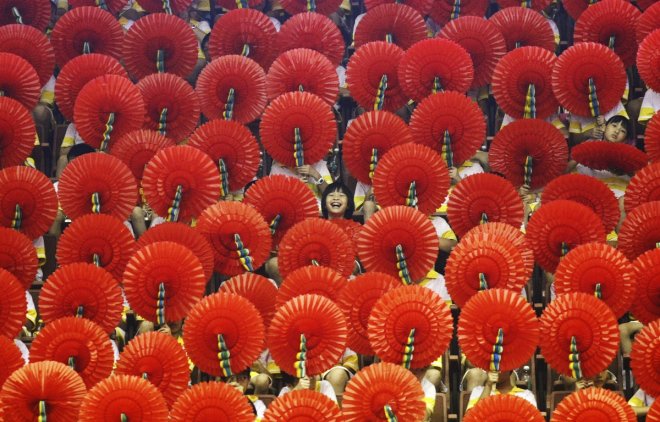
The Chinese people within the country and the region, as well as Chinese origin Diaspora across the world, celebrate the Lunar New Year on Saturday, welcoming the Year of the Rooster to the accompaniment of firecrackers, lantern displays and dance ensembles.
The Lunar New Year is the biggest celebration in China and is marked by family reunions, mammoth cross-country travel, lion and dragon dances, offering of sacrifices to ancestors, fireworks and a seven-day long national holiday. Frenzied shopping and frustrating traffic snarls across the country also mark the holiday celebration.
In Beijing, the central bell tower rang 108 times at midnight, officially announcing the dawn of the Year of the Rooster. Celebrations were held far and wide across the world, from Hong Kong to Singapore, from Lima in Peru to Manila and in many US and Asian cities.
"The New Year is about our future. Ultimately, it is the future of our children and our loved ones that drives us to give of our best. Let us approach this year of the Rooster with renewed determination, vigour and hope, to build our future together," Singapore Prime Minister Lee Hsien loong said in a message greeting residents on the Chinese New Year.
Here is a look at the Lunar New year customs, practices and after-event traditions:
Customs
Riot of Red: China is awash in red during the course of the festival as red is considered the country's lucky colour. The fascination with red ranges from red lanterns, red clothes, red- themed home decorations and red envelopes that are offered to children. Giving red envelopes, of course with money inside, symbolises health, wealth, luck and good academics for children in the New Year.
Re-union Dinner: Great pain is taken to make it for the re-union dinner. The opulent cuisine has symbolic meanings as well, such as the dumpling and the traditional sticky rice cake.
Spring Couplets: The couplets are also known as New Year couplets. These are auspicious phrases written in a specific order and ritually pasted up on doors. These paired phrases have seven Chinese characters etched in black ink on a red paper. The calligraphic effort is believed to have powers to ward off evil.
Offerings for Ancestors: The ancient practice of worshipping ancestors and offering sacrifices for them is still prevalent in the country. Sweeping tombs, offering prayers, holding special rituals at temples and homes etc are part of the traditions observed as a mark of respect to the ancestors.
Fireworks: Firecrackers are an integral part of the Chinese New Year festivities. At the stroke of the clock marking the New Year, massive fireworks go off in Chinese cities and even villages.
New Year Bell: The Chinese welcome the New Year by ringing large bells, which are believed to chime in good fortune, wealth and luck. There are bell ringing ceremonies in public squares and temples.
What happens after New Year bash?
There are more celebrations, observances, rituals, customary activities -- and of course even more travel!
First, the Chinese don't sweep their houses for two days after the New Year as they think it will mean the good luck of the New Year will also be swept away. So they sweep the house on the third day.
The day after the New Year is for married daughters to visit their parents. So this means another round of hectic cross-country travel. Even higher numbers of people hit the road between the third and the seventh day after New Year as this is the time for friends and relatives to visit each other.
The Day-8 after the New Year will see people return to their work and business. In Chinese beliefs 8 is the luckiest number and hence they consider it highly auspicious to re-start work and business on the 8th day of the New Year, even though it falls on a Sunday.








